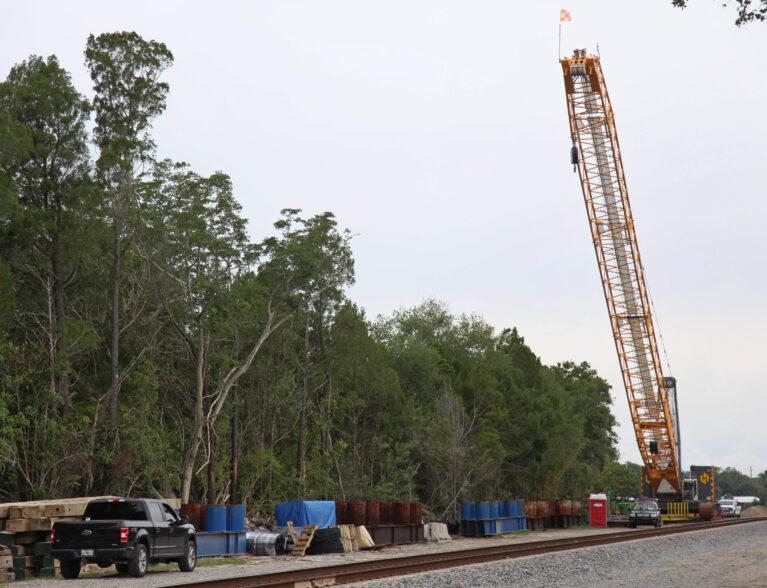
As Virgin Trains USA started pile-driving operations for the replacement of the historic St. Sebastian River Railroad Bridge, Congressman Bill Posey called for a federal safety study of the high-speed rail project.
Meanwhile, the U.S. Supreme Court gave Virgin Trains and the U.S. Department of Transportation until August 21 to submit briefs arguing why the justices should reject Indian River County’s last gasp appeal of the $4-billion passenger rail project’s governmental approvals.
Although Virgin Trains halted service between Miami and West Palm Beach on March 25 in response to the COVID-19 pandemic, the start-up company continues construction on 170-miles of high-speed tracks between West Palm and Orlando.
By the end of 2022, Virgin Trains plans to start operating 34 passenger trains per day between Orlando and Miami with top speeds reaching 110 mph on the Florida East Coast Railway tracks bisecting Indian River County.
Homeowners near the St. Sebastian River Railroad Bridge said Virgin Trains contractors started pile-driving operations Tuesday morning with a massive 290-ton Liebherr LR 1300 hydraulic crane.
Virgin Trains plans to spend $33 million constructing a new 1,625-foot-long concrete bridge and demolishing the steel bridge built in 1926. The project is due for completion in September 2022.
Patricia Hyden, whose 100-year-old riverfront home sits next to the bridge landing, said the low, steady rumble of the pile-driving operations occasionally gives way to inexplicably loud noise.
“Sometimes it’s just absolutely, horrendously loud,” Hyden said. “It was so loud, my husband and I couldn’t actually talk to each other – that’s how loud it was.”
“It vibrates the whole house,” Hyden said. “My dog, Doodles, hates it. She’s an older dog. She’s 16, so it makes her shake. She’s extremely unhappy.”
The daily presence of surveyors from the WGI consulting firm taking measurements of her home’s elevation makes Hyden wonder about the possible impacts of the pile-driving operation.
“The surveyor people had me a little stressed because I honestly don’t know: Do they expect my house to fall down?” Hyden said. “Obviously, Virgin Trains isn’t telling me anything.”
Mike Capps, whose home abuts the tracks just across 83rd Avenue from Hyden’s house, said he goes fishing during the day to avoid the construction noise.
“It’s going to make noise. They can’t help that,” said Capps, a semi-retired construction worker. “The decibels, I don’t know how high they are, but it’s not hurting my ears. I just can’t hear the TV.”
“It doesn’t shake the paintings off the wall, but it shakes the whole house a little bit,” Capps said. “Hopefully, they’ll be away from us before too long.”
Virgin Trains contractors are building a temporary work trestle platform in the river along the west side of the existing bridge.
The platform will enable the crane to remove unused girders from the western side of the bridge and install new concrete piles in the footprint.
Workers will construct the superstructure of the new westbound bridge atop the new piles and pile caps. The tracks will be realigned so Florida East Coast Railway freight trains can use the west bridge while a new eastbound bridge is being built.
The work trestle will be moved to the east side of the bridge to repeat the process of removing unused girders, installing new piles and pile caps and constructing the new superstructure.
The final steps are the removal of the remainder of the old bridge and installation of new tracks on the east bridge.
“We look forward to connecting South Florida to Orlando in 2022,” Virgin Trains said in a May 20 update about its response to COVID-19.
But Virgin Trains’ track record of killing 43 people in South Florida between January 2018 and March 17 has attracted the attention of the Treasure Coast’s Congressional delegation.
U.S. Representatives Posey (R-Vero Beach) and Brian Mast (R-Palm City) introduced a bill last Thursday that would require a federal study to determine how to improve motorist and pedestrian safety for the Virgin Trains project.
“Residents and local businesses have expressed safety concerns about the rail project given the high number of fatalities already associated with the train since its South Florida operations began in 2018,” Posey said in a statement on his Congressional web site.
The Pedestrian Safety Study Act directs the federal Railway and Highway administrations to conduct a motorist and pedestrian safety study along the Virgin Trains corridor and report back to Congress and Florida Department of Transportation within two years with recommendations on how to improve safety, particularly near schools.






